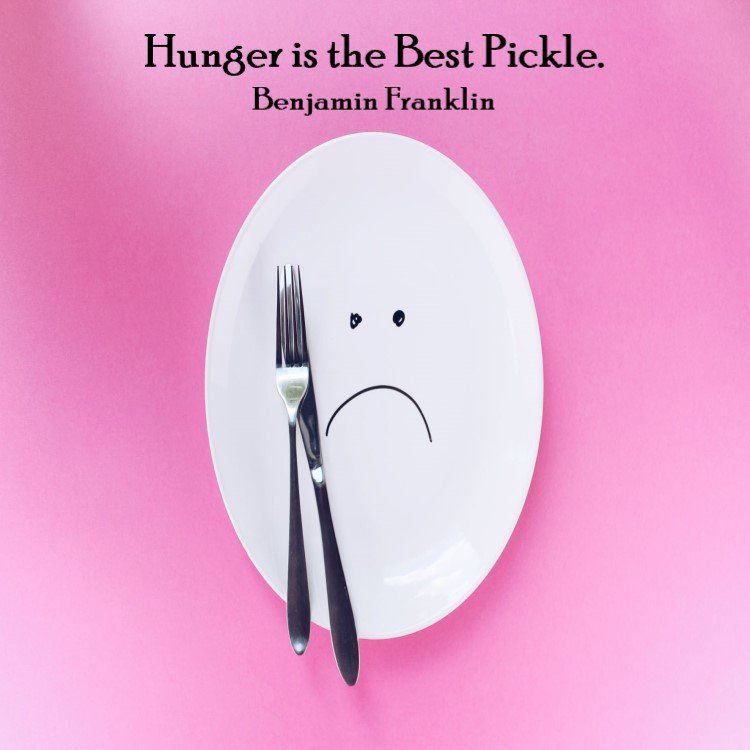The Trouble with Jesus
by Constance Hastings
The Trouble with Jesus is he uses the common and familiar
to speak to the deepest yearnings of the soul. Can it really be so simple?

“Hunger is the best pickle,” is attributed to having been penned by Benjamin Franklin in Poor Richard’s Almanack. He would write these sayings that would put two things together leaving the reader to decipher the meaning. He wasn’t the first to write this creatively though.
Jesus did the same thing. He’d say things that would send people into a tailspin of thought trying to understand what he meant by it. Poor souls, these guys didn’t have the advantage of high speed internet. They had to think, discuss, and chew on it themselves.
Food for Thought
Curious about Ben’s statement? To summarize one pundit (fortunate souls that we are to have Google), hunger refers to a motivation that is like a craving, almost urgent. Pickle is being in a situation from which you’d like to remove yourself. Let’s extend that a little more. In life, that which draws you out of yourself can ultimately expand your understanding of where you are now. In short, hunger can be a good thing because it makes you search for more than you have in the present.
“I am the Bread of Life.” John 6:35
When Jesus said this, people didn’t get it. Bread they knew. Just the day before he had fed more than 5000 people with only a kid’s lunch. They liked it. Bread for hungry bellies is a good thing. So they stalked him thinking they’d get more from his free buffet. But now he’s talking a different tune. They’re not getting it.
Bread is Filling
Jesus hinted at the source of their real hunger, why this was a bit of a struggle to understand. He admitted they needed this hunger for his Father to draw them to him. That meant as Bread of Life he was from God, therefore, bread from heaven itself.
So to partake of Jesus’ Bread is to recognize that a need, a craving can only be addressed by taking it in, chewing on it. Taste it; let its flavor and texture fill your mouth. What Jesus offers is that which once taken in will fill and stay in your gut, like a whole grain bread. To do so takes a good measure of trust born of and directed by hunger that comes from a love that provided the crowd with good bread and grace for empty souls.
Bread is Relationship
Fresh bread is delicious, but bread is all the better when it comes along side other foods. Dipped in seasoned oils, drenched in tangy sauces, slathered with mayonnaise and mustards, bread not only fills but brings with it desire for more. Add in savory meats or top with cooked eggs, and bread is better supportive of the other good foods that nurture.
Jesus as Bread of Life feeds as well when others are present in his presence, both neighbor and God, one adding to and supporting the other. This Bread is a bread that not only fills the empty life but relates to others and becomes better because of it.
Bread is Common
All cultures have their own forms of bread. By this, the commonality of bread is an image which speaks to all people and that to which people are draw for fulfillment. There is no going to strange, faraway localities to find it. One does not have to climb summits to discover it. There are no dense arguments to defend it. Bread is available, relatively easy to find, universally understood for what it means to sustain life.
Jesus as Bread of Life is meant to be the same. Common, accessible, Jesus speaks to the deep hungers of life. As he faced the crowd that day, they clamored for his bread as their ancestors had manna provided for the 40 years they migrated through the desert wilderness. His Bread of Life was likewise available for the asking, the believing in him as sent from God.
Bread Alone
Maybe you found yourself during times of depression, boredom, or the isolation we knew during the pandemic reaching for food when you weren’t really hungry. It wasn’t the food that you were wanted, but something to stimulate, give flavor to your life for which you were lonely and missing. That kind of filling though only adds unwanted results which ultimately can make you feel worse.
That day, Jesus’ thoughts may have drifted to another time when in his own physical hunger he’d been offered bread that would not sustain the spirit. His reply to his antithesis that day was from the ancient writings the crowd would remember. “One cannot live by bread alone, but by every world that comes from the mouth of the Lord.” (Deuteronomy 8:3)
Filling one’s life with that which does not satisfy or have eternal purpose will ultimately take from life, keep people in those pickles where they find themselves. That bread just won’t do it.
But to live fully is to find meaning in God’s wisdom offered so the world can fully live. Hunger for life’s meaning, purpose, and significance is satisfied by the Bread of Life. It begins with Jesus’ Bread and can’t be taken away.
“Anyone who eats this bread will live forever.”
Like This? Find More in
The Trouble with Jesus: Considerations Before You Walk Away by Constance Hastings
Available Now Wherever You Love to Buy Books!
Subscribe to The Trouble with Jesus Blog Here.














